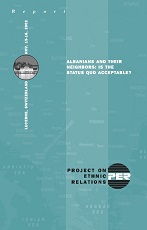Albanians and their Neighbors: Is the Status Quo Acceptable?
Albanians and their Neighbors: Is the Status Quo Acceptable?
Contributor(s): Allen H. Kassof (Editor), Livia Plaks (Editor)
Subject(s): International relations/trade, Security and defense, Inter-Ethnic Relations
Published by: PER Project on Ethnic Relations
Keywords: Albania as part of Western Balkanas;
Summary/Abstract: The interest of the Project of Ethnic Relations (PER) in the issue of Albanians and their neighbors goes back many years. In 1992, PER convened its first seminar for leading Albanian intellectuals from the region, to learn about their views on the interethnic situation in the Balkans. It was one of several consultations PER held with major ethnic communities in the Balkans at that time. In 1995, at a PER roundtable in Belgrade, PER brought together vice presidents of the Socialist Party of Serbia and the Democratic League of Kosovo, thus breaking a four-year self-imposed boycott by Kosovar Albanians on contacts with Belgrade. In 1997, PER brought Kosovo Albanian leaders and Belgrade officials to a landmark meeting in New York City, where they worked out a platform for future negotiations, but this process was interrupted when armed clashes broke out in 1998.
After the 1999 Kosovo war, PER renewed its efforts in the form of a series of regional discussions for senior politicians from the Balkans under the heading “Albanians and Their Neighbors.” The first roundtable was organized in April 2000 in Budapest, with the assistance of the Government of Hungary. The second meeting took place in Athens in December of that year with support from the Greek Government.
The third roundtable, which is the subject of this report, took place in Lucerne in November 2003, with the support and cooperation of the Swiss Federal Department of Foreign Affairs.
Series: PER Reports
- Page Count: 49
- Publication Year: 2002
- Language: English
- Content File-PDF

